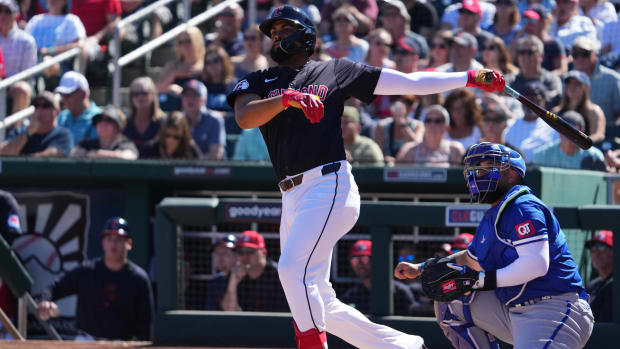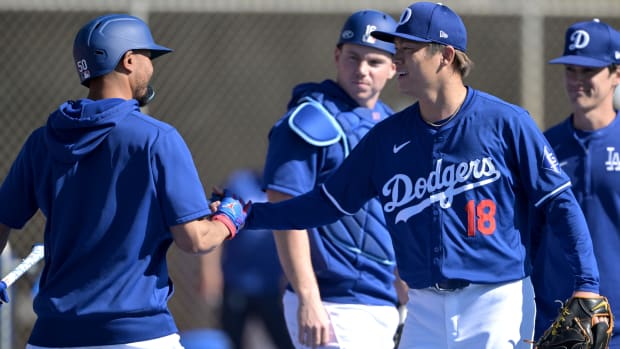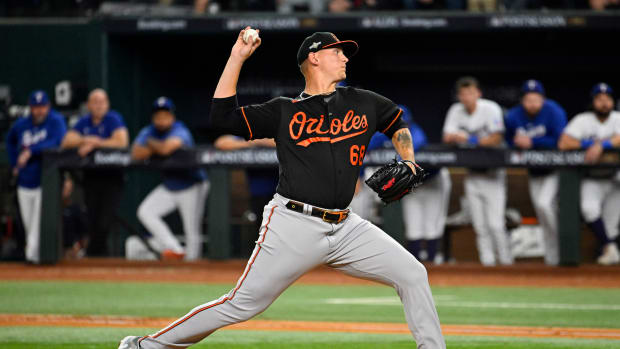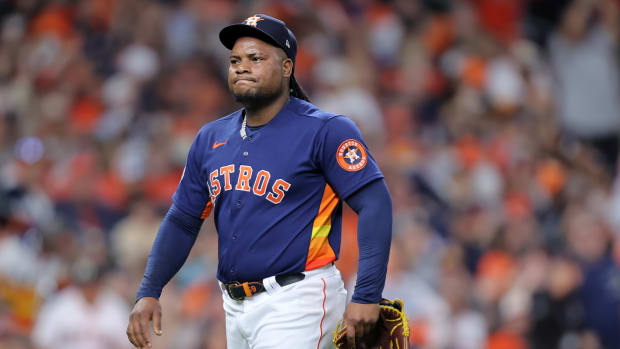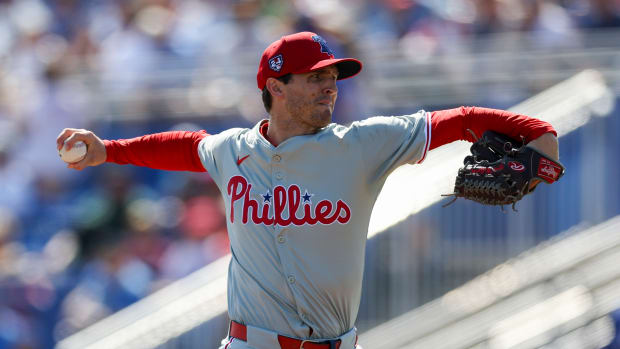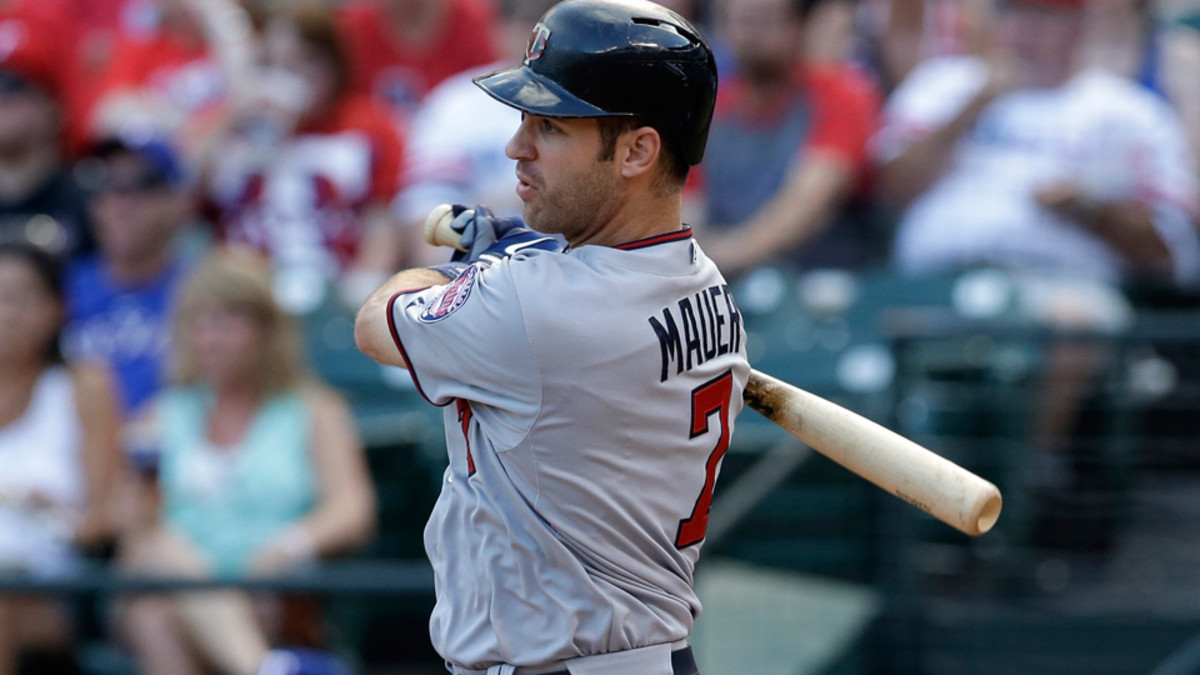
Oblique injury sidelines Joe Mauer amidst career-worst season
When the Twins decided to move Joe Mauer out from behind the plate after the end of last season, they banked on increasing both his availability and his productivity. But halfway through his first season as a full-time first baseman, Mauer's bat hasn't been up to snuff, and after leaving Tuesday night's game against the Royals, the 31-year-old six-time All-Star is headed to the disabled list with a strained right oblique.
Mauer had been dealing with soreness in the oblique for at least a week. He aggravated the problem while connecting for a double in the fourth inning of Tuesday's game and was still sore on Wednesday. The injury will prevent him from participating in the All-Star festivities to be held at Target Field later this month, not that his performance — more on which momentarily — guaranteed him a spot on the American League roster.
The decision to move Mauer from catcher to first base was prompted by a foul tip-induced concussion sustained last August, one that that wound up preventing him from returning to action. Mauer attempted to rehab his way back into the lineup, but post-concussive problems including "sensitivity to light and noise, irritable moods and headaches" lingered into October, prompting consultations with the Mayo Clinic and team physicians, and ultimately, a reconsideration of his career path.
Though Mauer finished the year with a very representative .324/.404/.476 batting line, his 113 games played marked the second time in three years that he had spent at least a quarter of the season on the disabled list; in 2011, offseason knee surgery and bilateral leg weakness limited him to 82 games. Since winning the AL MVP award and the last of his three batting titles back in 2009, he has averaged just 120 games and 516 plate appearances a season.
Mauer had played in 76 of the Twins' first 82 games this year, missing five straight games in early May due to lower back spasms but otherwise sitting out just one game. While his work at first base — a position where he had played 56 career games prior to this year, never more than 30 in a season — has been more or less average (+1 Defensive Runs Saved, −1.5 Ultimate Zone Rating), his .271/.342/.353 line represents a career low in all three slash-stat categories, and he has only two home runs.
Moreover, Mauer's 1.9 strikeout-to-walk ratio is by far his career worst, dwarfing last year's previous high of 1.5; this is a hitter who still has more walks (650) than strikeouts (628) since he arrived on the scene in 2004. In all, it's an ominous showing for a player who's owed $23 million a year through 2018 — roughly $103 million in all including the remainder of this season.
Taking a closer look into Mauer's splits — which admittedly, still consist of some fairly small sample sizes — a few things stand out in particular:
• While Mauer's shown a substantial platoon split over the course of his career (.922 OPS against righties, .746 against lefties), it's even wider this year (.775 against righties, .537 against lefties); he has just two doubles and no homers in 113 PA against southpaws en route to a .225/.292/.245 line, more or less a carbon copy of a similarly poor showing in 2011.
• Mauer's getting smothered in his first plate appearance against starting pitchers (.171/.237/.186 with one measly double in 76 PA) but hitting a sizzling .359/.375/.489 in 73 PA the second and third times through, which at least suggests that he's still able to make good adjustments between plate appearances.
• Mauer has hit a paltry .273/.304/.324 in 184 PA with nobody on base while walking in just 4.3 percent of such plate appearances, roughly one-third his career rate. He’s batting a far more productive (if still fairly thin) .268/.387/.394 in 155 PA with men on base while walking 16.8 percent of the time.
Earlier this year, Twins broadcaster Dick Bremer reported that the organization felt that Mauer's production was suffering due to his facing an increased number of defensive shifts, albeit not in the stereotypical manner of loading up of the right side of the infield, à laDavid Ortiz or other pull-conscious lefties. Instead, according to Bremer, teams have been employing outfield shifts against him with more frequency, with the leftfielder often playing in the leftfield corner. I don't have actual shift data to accompany this, but more than a month later, neither the theory nor the trend hold up to close scrutiny. Mauer has put a ball in play to the opposite field 28 percent of the time and is batting .493/.485/.716 on such balls, compared to a career rate of going oppo 24 percent of the time and hitting .437/.427/.686. Meanwhile, he's pulling the ball just 14.5 percent of the time, down from a career rate of 17 percent, and has hit just .200/.200/.257 when pulling, compared to .379/.377/.504 career.
So while it's tempting to chalk Mauer's falloff to his concussion — paralleling the sad decline of former teammate Justin Morneau, who hit just .256/.319/.406 from 2011-2013 after batting .286/.358/.511 prior — it's hardly clear that it's the underlying cause of his current problems. With so many back and knee problems in his past, not to mention 920 games behind the plate, Mauer’s body has more mileage on it than those of most 31-year-old players. That said, he was at least starting to heat up when he got hurt, hitting .362/.400/.489 over the course of a 12-game hitting streak.
Hopefully, Mauer will be back in action soon after the All-Star break and can quickly recover that form. Even if they’re not a threat to reach the postseason, the Twins have a lot riding on it.






























